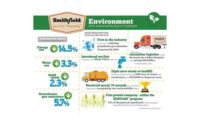Seventy-percent of U.S. consumers are motivated to buy products that are better for the environment but only 40 percent are willing to pay more for those products.
Seventy-percent of U.S. consumers are motivated to buy
products that are better for the environment but only 40 percent are willing to
pay more for those products. That’s one of several consumer insights found inBrandSpark
International’sfirst “American Grocery Shopper Study,”
released on Jan. 28, 2009. The survey included more than 50,000 U.S.
shoppers. Responding to another packaging-related question, 78 percent of those
surveyed told the Toronto
researcher they believe manufacturers “have a long way to go” to reduce the
amount of packaging.
With an initial $400,000 gift from The Coca-Cola Co.,Michigan State University
took an important step in January toward opening itsCenter
for Packaging Innovation and Sustainability. Housed at MSU’s
School of Packaging in East Lansing, Mich., the new center will be a “think
tank for packaging innovation and sustainability and education hub to measure
and reduce packaging’s environmental impact,” say school officials. MSU
packaging, engineering and supply chain management researchers will join in
collaborative, nonproprietary and proprietary research with industry partners.
NatureWorks LLC,
Minnetonka, Minn., says independent lifecycle studies prove its
biopolymer-based Ingeo clamshell packaging – suitable for refrigerated deli sandwiches
and salads – emits fewer greenhouse gases and uses less energy than equivalent
PET and rPET (recycled polyethylene teraphthalate) clamshells.
Get our new eMagazine delivered to your inbox every month.
Stay in the know on the latest food and beverage manufacturing markets.
SUBSCRIBE TODAYCopyright ©2024. All Rights Reserved BNP Media.
Design, CMS, Hosting & Web Development :: ePublishing

